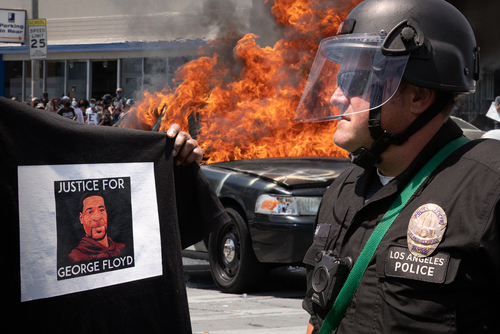
In a move that has sparked considerable debate, the city of Seattle has decided to settle a lawsuit with a group of Black Lives Matter protesters for $10 million. The lawsuit stemmed from claims of excessive force used by the police during the riots that erupted in the wake of George Floyd’s death in 2020.
The settlement, which was announced on January 26th, 2024, will be distributed among 50 plaintiffs who alleged they were victims of police brutality during the demonstrations. Despite the substantial payout, the city has not admitted any wrongdoing as part of the agreement.
BLM protesters who participated in 2020 riots will receive $10 million from Seattle https://t.co/bTnydm2il3 pic.twitter.com/YiQG0wvexj
— TheBlaze (@theblaze) January 25, 2024
This decision comes after a lengthy legal battle involving extensive evidence, including over a million pages of records and more than 10,000 videos. The plaintiffs’ attorneys have cited severe injuries sustained by their clients, ranging from heart attacks to permanent hearing loss, as a result of the police department’s actions.
Critics of the settlement argue that it sets a dangerous precedent, rewarding individuals involved in what were, at times, violent and destructive protests. They point out that such settlements may encourage similar lawsuits in the future, potentially leading to a misuse of taxpayer dollars.
SEATTLE to pay
$10 million dollars in settlement to BLM rioters…DENVER to pay
$4.7 million dollars in settlement to BLM rioters…PHILADELPHIA to pay
$9 million dollars in settlement to BLM rioters…NEW YORK CITY to pay
$13 million dollars in settlement to BLM rioters……— 💖2024~TRUMPS BLONDE~2024💖 (@2024DJT2024) January 26, 2024
Supporters of the settlement, however, see it as a necessary step towards accountability and reform. They argue that the compensation is justified given the severity of the injuries reported and the impact on the protesters’ lives.
The financial burden of this settlement on the city’s budget is significant. It raises questions about the management of public funds, especially considering that other cities across the nation have also paid out multimillion-dollar settlements related to the George Floyd protests.
Seattle’s City Attorney Davison has defended the decision as a financially prudent move, considering the potential costs and risks associated with proceeding to trial. The settlement is seen as a way to close a chapter on the events of 2020 and allow the city to focus on current issues.
As the dust settles on this legal dispute, the broader implications for civic engagement and law enforcement practices remain hotly contested. The debate continues on whether such settlements serve the public interest or merely incentivize further unrest.










